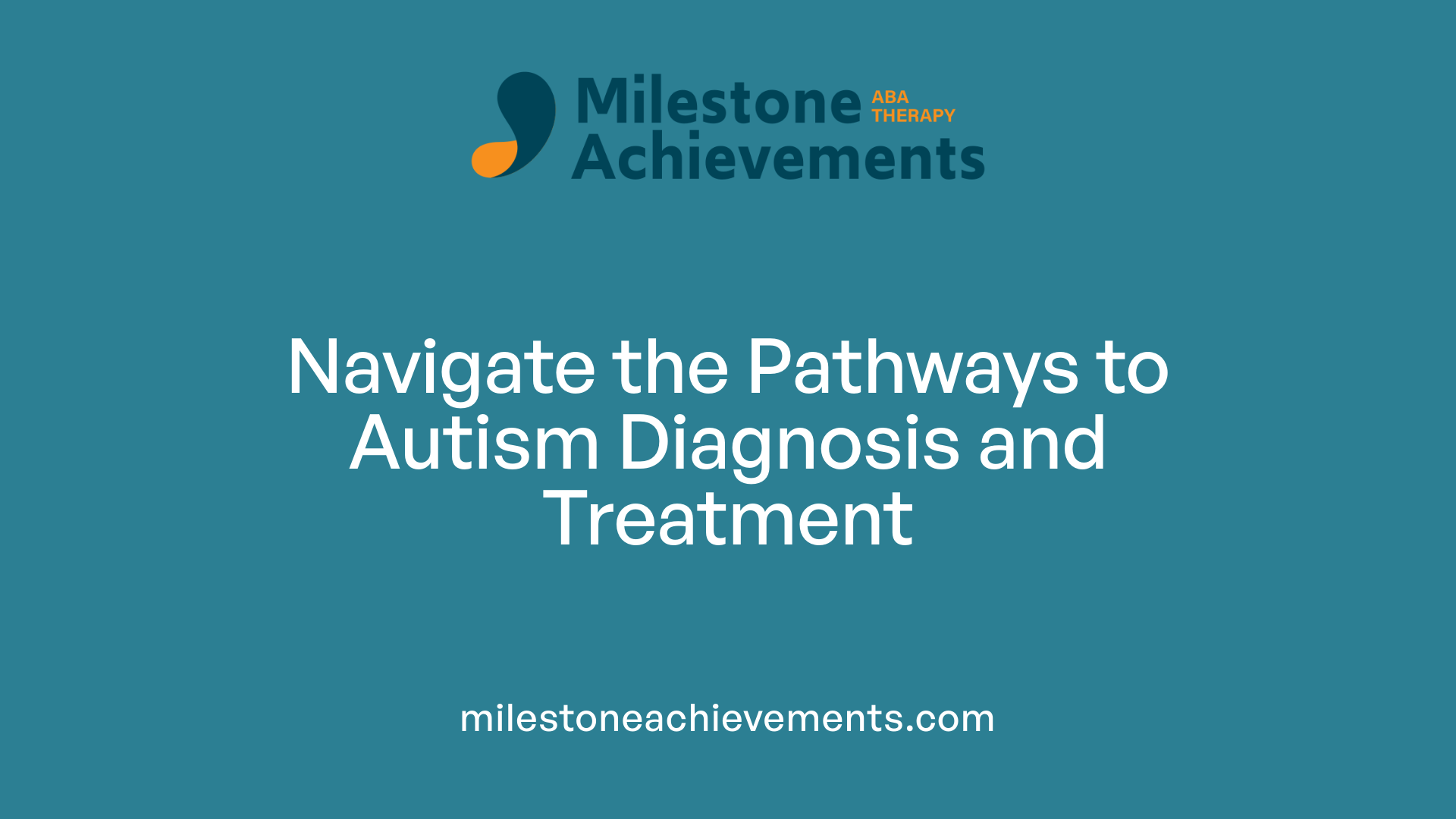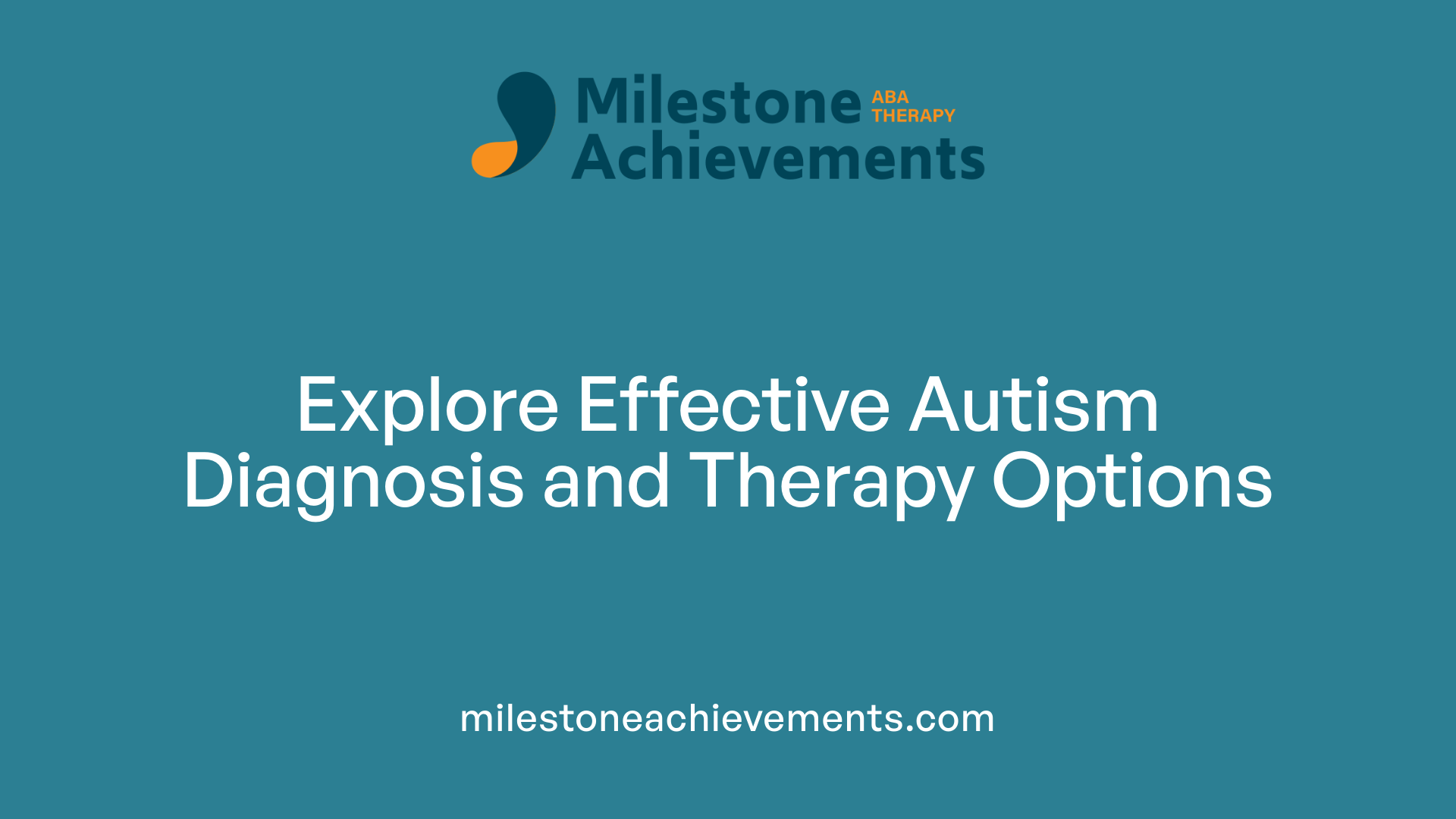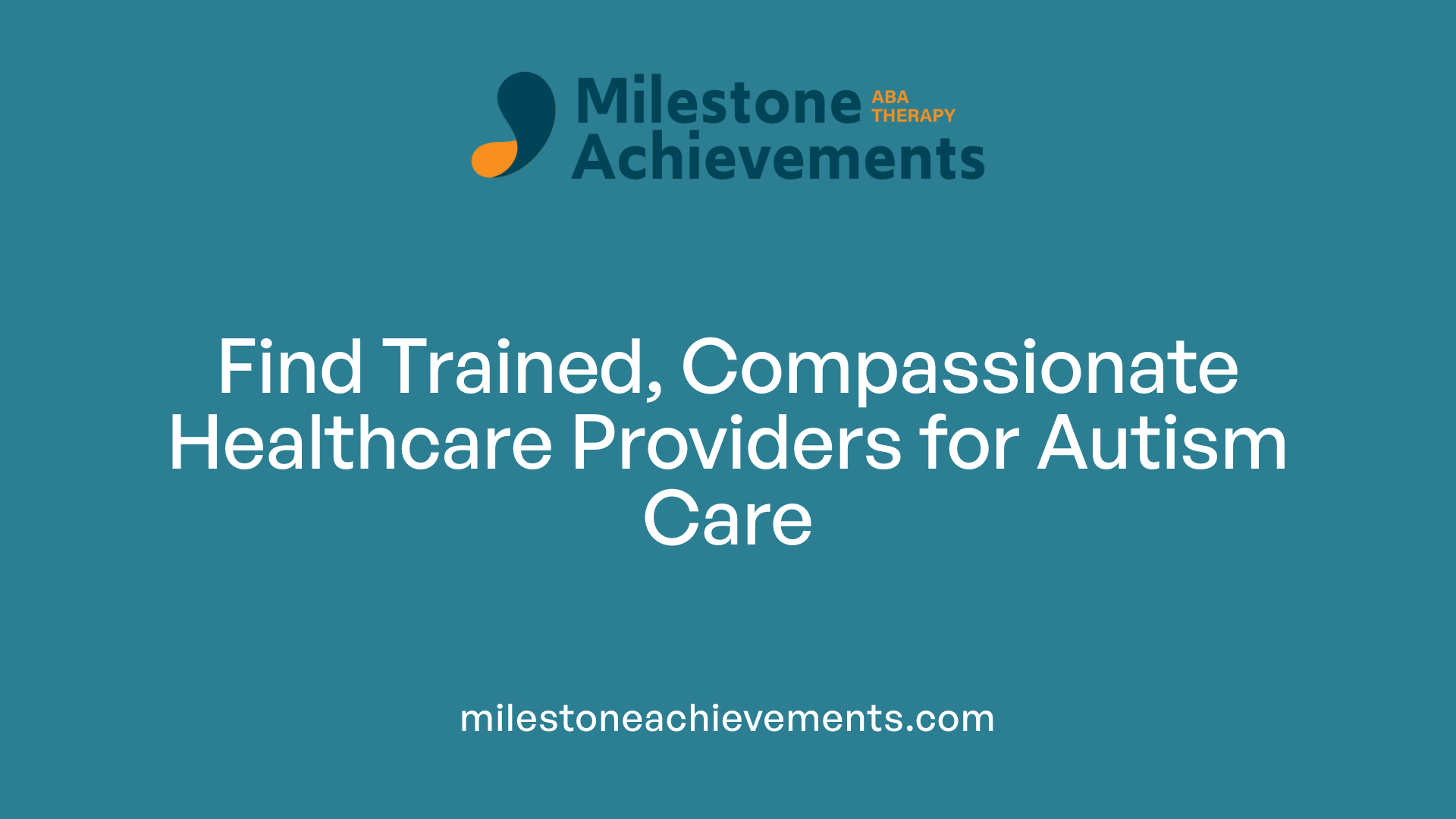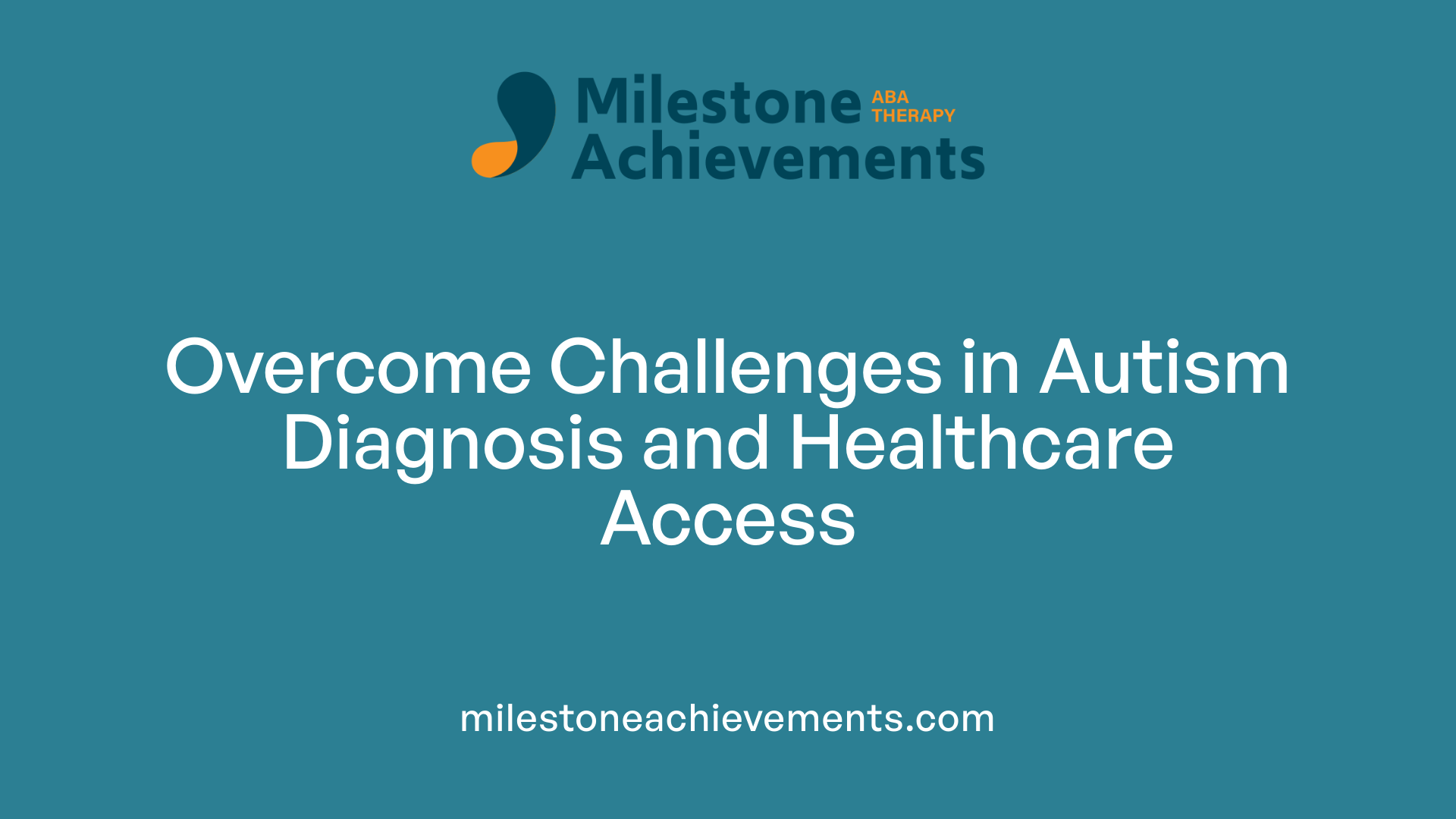
How to Navigate the Healthcare System for Autism Treatment
Empowering Families and Patients in Autism Healthcare Navigation
Understanding the Pathway to Autism Care within the Healthcare System
Navigating the complex landscape of healthcare for autism can be daunting for families and individuals alike. From diagnosis to ongoing treatment and transition across life stages, understanding how to effectively access, advocate for, and manage autism-related healthcare is vital. This guide offers comprehensive insights on fostering better healthcare experiences and outcomes for autistic individuals.
Initiating Autism Diagnosis: Pathways and Essential Steps

How can individuals access autism treatment within the healthcare system?
Accessing autism treatment involves navigating a complex healthcare landscape with various pathways. The initial step often begins with early developmental checkups during which healthcare providers observe a child's growth and behavior.
If signs of autism are suspected, families should seek referrals to specialists such as child psychiatrists, psychologists, or developmental pediatricians for comprehensive assessments.
Behavioral assessments and careful observation are integral, involving standardized tools and clinical judgment to evaluate social, communication, and behavioral patterns.
In addition, genetic testing and other diagnostics may be recommended to identify underlying causes or co-occurring conditions, aiding in personalized treatment planning.
Parents and caregivers can directly approach healthcare providers trained in autism-friendly care. It's essential to advocate for comprehensive services, especially through programs like Medicaid, which covers many children and adults with autism.
Once diagnosed, children qualify for therapies such as speech, occupational, and behavioral interventions. These services can often be accessed through local health departments or educational programs, sometimes supported by policies like Individualized Education Programs (IEPs).
Transitioning to adult healthcare involves proactive planning to ensure continuous support. Maintaining advocacy, staying informed of policy changes, and seeking specialists knowledgeable about autism are crucial steps.
Overall, a coordinated effort between families, healthcare providers, and community resources enables better access to necessary care, fostering improved outcomes throughout the lifespan.
Understanding and Choosing Appropriate Treatment Options

What are the diagnosis and treatment options for autism, and how can care be planned effectively?
Diagnosing autism spectrum disorder (ASD) typically involves comprehensive behavioral observations, review of developmental history, and sometimes genetic testing, since no single medical test confirms autism. Doctors such as child psychiatrists, psychologists, or developmental pediatricians usually make the diagnosis.
Once diagnosed, a variety of treatment options are available. Early intervention is vital, especially during preschool years, to support the development of social skills, communication abilities, and daily functioning. These treatments are highly individualized, aiming to meet each child's unique needs.
Behavioral therapies like applied behavior analysis (ABA) are among the most evidence-based approaches, focusing on reinforcing positive behaviors and reducing problematic ones. Speech therapy helps improve communication skills, while occupational and physical therapies address sensory processing issues and motor skills development.
Educational and family therapies complement clinical treatment, providing structured support within learning environments and assisting families in managing daily routines and challenges.
Managing co-occurring symptoms, such as anxiety, irritability, or hyperactivity, often involves medication. These medications do not cure autism but can help control specific symptoms, improving overall well-being.
Effective care planning requires a multidisciplinary approach. It should incorporate evidence-based treatments, family involvement, and support systems tailored to the child's evolving needs. Regular assessments and adjustments ensure interventions remain relevant.
Advancements in genetic screening and personalized treatments hold promise for more targeted approaches in the future. However, a significant barrier remains: ensuring equitable access to these therapies and services across diverse populations.
Overall, early diagnosis combined with a comprehensive, individualized care plan can significantly improve developmental outcomes and quality of life for autistic individuals.
Connecting with Autism-Competent Healthcare Providers
 Finding healthcare providers who are equipped to care for individuals with autism requires deliberate research and informed communication. Families and caregivers can start by exploring specialized directories such as AASPIRE (Autism Service Provider Directory), ECHO Autism, and Psychology Today, which often include filters for professionals trained in autism-related care. These resources help connect families with clinicians who understand the unique needs of autistic individuals.
Finding healthcare providers who are equipped to care for individuals with autism requires deliberate research and informed communication. Families and caregivers can start by exploring specialized directories such as AASPIRE (Autism Service Provider Directory), ECHO Autism, and Psychology Today, which often include filters for professionals trained in autism-related care. These resources help connect families with clinicians who understand the unique needs of autistic individuals.
During medical visits, it is important to ask providers about their experience with autism. Questions regarding their training, familiarity with autism-specific therapies, and approach to individualized care can help determine if they are suitable. Families should seek healthcare professionals who display cultural competence and are open to accommodations.
Enhancing provider knowledge through Continuing Medical Education (CME) courses is an effective way for clinicians to stay updated. For example, Harvard Medical School offers a CME-accredited course titled "Clinical Care for Autistic Adults," which aims to improve provider understanding and treatment strategies.
Engagement with community organizations further supports finding qualified providers. Connecting with autism support groups, parent organizations like TACA (Talk About Curing Autism), or local advocacy events can reveal trusted healthcare professionals experienced in autism care.
Ultimately, advocacy and thorough research empower families to select practitioners who can offer respectful, effective, and tailored healthcare. Asking pertinent questions and utilizing trusted directories ensures that individuals with autism receive the competent care necessary for their well-being.
| Resource Type | Example Platforms | Focus Areas | Additional Details |
|---|---|---|---|
| Provider Directories | AASPIRE, Psychology Today, ECHO Autism | Autism-specific healthcare providers | Lists trained clinicians, with filters for experience and location |
| Certification Courses | Harvard’s 'Clinical Care for Autistic Adults' | Autism-specific medical training | CME-accredited programs aimed at improving care |
| Support Organizations | TACA, Autism Speaks, local parent groups | Community support, resources | Offer guidance on local and online provider access |
Managing Healthcare Transitions Across Life Stages

What are strategies for managing healthcare transitions, such as from pediatric to adult autism care?
Managing healthcare transitions effectively is crucial for individuals with autism to maintain continuity of care and support independence as they grow older.
A successful transition begins early, ideally around age 12 to 14. During this period, families and caregivers should work closely with healthcare providers to develop a detailed, personalized transition plan. These plans include important areas such as medication management, understanding health conditions, and navigating healthcare appointments.
Building skills for health management is a key component. Young individuals should learn how to communicate their needs, understand their health issues, and prepare for medical visits independently when appropriate.
Utilizing structured policies and programs tailored to transition age youth can facilitate smooth handoffs from pediatric to adult healthcare systems. Special care coordinators and transition checklists serve as practical tools to guide this process.
Addressing existing barriers is vital. This includes advocating for better provider training so healthcare professionals are equipped to serve autistic adults, addressing gaps in service access, and advocating for comprehensive health coverage that supports lifelong care.
By fostering collaboration among families, healthcare teams, and community resources, and focusing on individual developmental needs and preferences, health outcomes can be significantly improved. Ongoing assessment and flexibility ensure that each young person continues to receive appropriate, competent care as they transition into adulthood.
Tackling Barriers to Autism Diagnosis and Healthcare Access

What are common barriers to autism diagnosis in healthcare, and how can they be addressed?
Many individuals with autism face significant hurdles when accessing healthcare, from delays in diagnosis to difficulties in obtaining appropriate treatments. A primary obstacle is the shortage of trained specialists such as child psychiatrists, psychologists, and developmental pediatricians who are equipped to diagnose and treat autism. This scarcity results in long wait times, often delaying early intervention, which is crucial for positive development outcomes.
Systemic inequalities further compound these challenges. Racial, socioeconomic, and geographic disparities mean that children and adults in underserved communities are less likely to receive timely diagnoses or ongoing care. These inequities can stem from a lack of universal screening practices, limited healthcare facilities in rural areas, and bias within healthcare systems.
Screening and referral processes also face difficulties. Primary care providers may lack confidence or training to identify early signs of autism, leading to missed opportunities for early diagnosis. While screening tools like the M-CHAT are available, their effective use depends on provider education and system support. Moreover, uncertainties about the diagnostic accuracy or the best approach to refer a patient to specialists can hinder prompt action.
Parental awareness plays a crucial role. Many parents have limited knowledge about autism signs or are influenced by stereotypes, which may lead to delays in seeking evaluation or support. For example, misconceptions about typical childhood behavior can cause delays in recognizing the need for assessment.
Addressing these barriers requires a comprehensive approach. Increasing provider training in autism recognition and care is vital. Implementing universal screening during childhood checkups, improving referral pathways, and expanding telehealth services can make diagnosis more accessible. Policies aimed at reducing disparities—such as funding for community-based programs—and promoting continuous education about autism are also essential.
Ultimately, fostering an equitable healthcare system with well-trained providers, accessible diagnostics, and informed families can significantly improve early detection and intervention, leading to better long-term outcomes for individuals on the autism spectrum.
Overcoming Challenges in Healthcare Access for Autistic Adults
What barriers exist in accessing autism-related healthcare services, and how can they be overcome?
Autistic adults frequently face a range of obstacles when seeking healthcare, which can lead to unmet health needs and worsening conditions. Common barriers include difficulties communicating with providers, sensory sensitivities that make clinical environments overwhelming, and systemic issues such as limited appointment times or provider knowledge gaps.
Many autistic individuals report feeling misunderstood or stigmatized by healthcare staff. These experiences can discourage them from seeking care or fully explaining their symptoms, resulting in misdiagnoses or untreated issues. Financial barriers such as high costs and insurance limitations also restrict access, especially for those with inadequate coverage.
To address these challenges, healthcare systems are encouraged to implement several practical strategies. Creating sensory-friendly environments with adjustable lighting, noise reduction, and quiet waiting areas can make clinics more welcoming. Additionally, training healthcare providers in autism-specific communication, trauma-informed care, and cultural competence helps ensure respectful, effective interactions.
Expanding flexible options such as telehealth visits allows easier access for those who experience anxiety or mobility issues. Longer appointment times and better care coordination among specialists can improve health outcomes by enabling thorough assessments and consistent follow-up.
Involving autistic individuals in healthcare planning and policy development is crucial. Their insight helps tailor services to actual needs, fostering trust and encouraging proactive health management. Overall, tackling these barriers requires a comprehensive approach that emphasizes accessibility, understanding, and respect.
Implementing systemic changes—like improved insurance policies, increased provider training, and support networks—can significantly improve healthcare experiences for autistic adults. Ultimately, ensuring equitable access to quality care enhances health outcomes, independence, and quality of life.
Essential Healthcare Provider Considerations for Autism Care
What should healthcare providers keep in mind when working with patients with autism?
When caring for individuals with autism, healthcare providers need to adopt a respectful, person-centered approach. Recognizing and honoring each person’s unique needs, communication styles, and sensory sensitivities is critical. Many autistic patients experience heightened sensitivities to lights, sounds, textures, and touch, which can make medical environments overwhelming.
Effective communication is a cornerstone of quality autism care. Providers should use clear, concrete language and incorporate visual supports, checklists, or simple instructions to help patients understand procedures and reduce anxiety. Avoiding ambiguous language and providing information in an accessible manner ensures patients are well-informed and comfortable.
Preparation and flexibility are essential. Maintaining routines and familiar care team members can improve trust and cooperation. When unpredictable behaviors occur, providers should remain patient and adaptable, employing strategies such as offering breaks or using calming techniques.
Engaging caregivers and families in planning ahead can be very helpful. Discussing potential accommodations and having backup plans ensures smoother interactions. For example, scheduling appointments at times when the clinic is less busy or providing sensory-friendly rooms can make a difference.
Ongoing education about autism and listening to the voices of autistic individuals are vital. Providers should continually update their knowledge through training, stay informed about evolving best practices, and foster an empathic, supportive environment. By doing so, healthcare professionals can deliver effective, respectful, and equitable care tailored to the needs of autistic patients.
The Role of Advocacy, Resources, and Support Networks in Autism Healthcare
How can advocacy improve access to autism treatment and support within the healthcare system?
Advocacy plays a vital role in enhancing healthcare access for autistic individuals by influencing policies and laws that protect their rights. Organizations like Autism Speaks and the Autistic Self Advocacy Network push for legislative protections such as the Americans with Disabilities Act (ADA) and the Mental Health Parity Act, which aim to ensure fair coverage for autism-related treatments. They actively work to safeguard and expand Medicaid, a crucial insurance program providing coverage for many with autism, including children and adults.
Advocates also develop and promote resources that help families navigate complex healthcare systems, such as toolkits and educational programs. These resources guide families on how to find autism-competent providers, communicate effectively with healthcare professionals, and advocate for essential accommodations.
Furthermore, advocacy groups push for the inclusion of autism-specific training in medical education. This helps improve healthcare practitioners’ understanding of autism, mitigates knowledge gaps, and promotes trauma-informed, sensory-friendly care environments.
By shaping policies, increasing awareness, and supporting resource development, advocacy significantly reduces barriers—such as high costs, limited services, and insufficient provider training—making healthcare more accessible and equitable for autistic individuals.
Additional Resources and Support Networks
Community organizations provide vital support, including peer networks, community-based programs, and national directories to connect autistic individuals with qualified healthcare providers. Telehealth services have emerged as an effective tool to bridge gaps, especially in underserved areas, by granting access to specialists regardless of geographic barriers.
Various tools, like the Autism Healthcare Accommodations Tool (AHAT), assist families in identifying necessary adaptations and communicating needs to healthcare providers, ensuring respectful and effective care.
Policy and Education Advocacy Initiatives
Efforts to improve medical training include expanding autism-related curricula for healthcare workers, emphasizing the importance of understanding sensory sensitivities, communication styles, and co-occurring conditions. These initiatives aim to equip clinicians with the skills needed to deliver individualized, respectful, and competent care.
Advocacy is also crucial in long-term research funding and policy reforms that support innovative treatments and inclusive healthcare programs tailored for diverse populations, including those in lower-resource settings.
By mobilizing community resources, enhancing professional training, and influencing policy changes, advocacy and support networks work together to improve healthcare experiences and outcomes for autistic individuals worldwide. These efforts foster an environment where autism treatment and support are accessible, respectful, and effective.
Supporting Autistic Individuals During Healthcare Visits: Practical Tools and Strategies
What is the Autism Healthcare Accommodations Tool (AHAT) and how does it help individuals with autism during healthcare visits?
The Autism Healthcare Accommodations Tool (AHAT) is an innovative online resource created by the AASPIRE Healthcare Toolkit. It is designed to assist autistic individuals in clearly communicating their specific needs and preferences to healthcare providers.
Using the AHAT, users create an account and complete a straightforward survey about their sensory sensitivities, communication styles, and other support needs. The tool then generates a personalized accommodations report that summarizes these needs and suggests helpful strategies.
Healthcare providers can use this report to better understand what a patient requires, enhancing communication and comfort during medical visits. This proactive approach helps make healthcare encounters more respectful, accessible, and effective.
Overall, AHAT empowers autistic patients to advocate for themselves and supports providers in delivering tailored care, reducing anxiety and improving health outcomes.
Empowering Pathways for Better Autism Healthcare Outcomes
Navigating the healthcare system for autism treatment requires proactive planning, education, and advocacy. By understanding available diagnostic and treatment options, connecting with autism-competent providers, managing transitions, overcoming barriers, and utilizing practical tools like the AHAT, families and individuals can significantly improve their healthcare experiences. Cultivating awareness, fostering respectful communication, and engaging community resources are crucial steps toward ensuring equitable, effective, and compassionate care for all individuals on the autism spectrum. Building a supportive network and advocating for systemic change are essential for creating a future where autism-specific healthcare needs are met with competence and dignity.
References
- Accessing comprehensive health care - Autism Speaks
- Tackling healthcare access barriers for individuals with autism from ...
- AAHR Health Care Toolkit - Adult Autism Health Resources
- Autism spectrum disorder - Diagnosis and treatment - Mayo Clinic
- Understanding Healthcare Challenges for Autistic Individuals
- The Complexities of Navigating the Healthcare System as an Autistic ...
- Autism spectrum disorder - Diagnosis and treatment - Mayo Clinic
- Treatment and Intervention for Autism Spectrum Disorder - CDC
- What are the treatments for autism? | NICHD


Partner with us on your child's journey
Milestone Achievements offers evidence-based ABA therapy to help children with autism reach their full potential. Together we’ll set meaningful goals and celebrate progress every step of the way.
Start ABA Services Today


